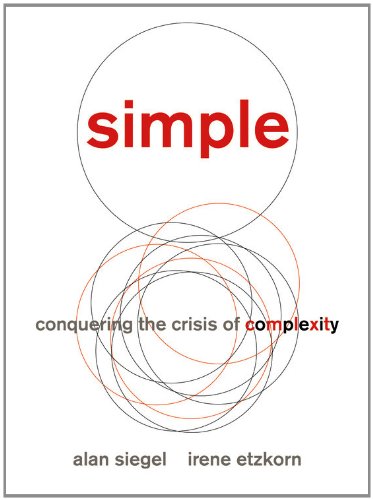They envision a world in which health records, directions for taking medication, and insurance policies are simple enough for ordinary college educated people to understand. They also mention my personal favorite, the EULA (the end-user license agreements that we all agree to but no one reads), and they go so far as to imagine “a simplified tax code that will eliminate the need for costly tax return preparation by professionals.”

The take-away message in the article (and their book published a couple of days later, Simple: Conquering the Crisis of Complexity. Twelve, 2013.) is that successful companies will eliminate the complexity of too many choices and decisions for customers to make. They advocate what I call the Googlification of information. But while this may (or may not) be a new word, it is not really a new idea. You might be familiar with the acronym, KISS. According to Wikipedia, the principle, “Keep It Simple Stupid” dates back to the 1960s – long before the information explosion.
The authors, who blame lawyers and technologists for unnecessarily confusing us, recognize that simplifying complexity is not easy. I agree.
It made me think about our online library and WorldCat Local, the library’s catalog – which is not just a “catalog” of the library’s holdings anymore. It is a “discovery tool” with which you can find journal articles, ebooks, and even books that we don’t have (but we can get) – all using a single search. Isn’t that great? Our students and faculty love it -- at first. After all, it looks like Google and appears to work like Google. Simple and uncluttered.
But we librarians know it is not Google. Based on our understanding of the complexity behind it, we often use the Advanced Search options to get what we want faster. We want to find the information we need and get on with the task at hand and we know that our users want to do the same thing.
But rather than explain everything we want our patrons to know on the home page (who would read it?), we have empathy for them. It is our goal to make it simple enough to find their own way when they’re ready. Furthermore, librarians want our patrons to learn as they go – not just to find what they are looking for today, but to succeed in becoming competent researchers for life. But how?
We take advantage of usability studies, observe patterns of our student search behaviors, and listen very carefully for feedback. When someone asks a question – particularly one of a technological nature – we consider whether there is something that can be done to make it clearer in the future.
Consistent and clear terminology is important, but even details such as size, color, and style of font, appearance and placement of links and buttons are serious topics of discussion in the library almost every day.
So, when you reach your search frustration threshold, look for the link that goes by many names:
- Email a librarian
- LibAnswers
- Need Help?
- Ask us a question
- Ask-A-Librarian
*~*~*~*~*~*~*~*~*~*~*~*~*~*~*~*~*~*~*~*~*~*~
 Robin Hartman is Director of Library
Services at Hope International University. She is curious about how
the organization and communication of information shapes society and
is committed to equipping students to impact the world for Christ.
Robin Hartman is Director of Library
Services at Hope International University. She is curious about how
the organization and communication of information shapes society and
is committed to equipping students to impact the world for Christ.
No comments:
Post a Comment